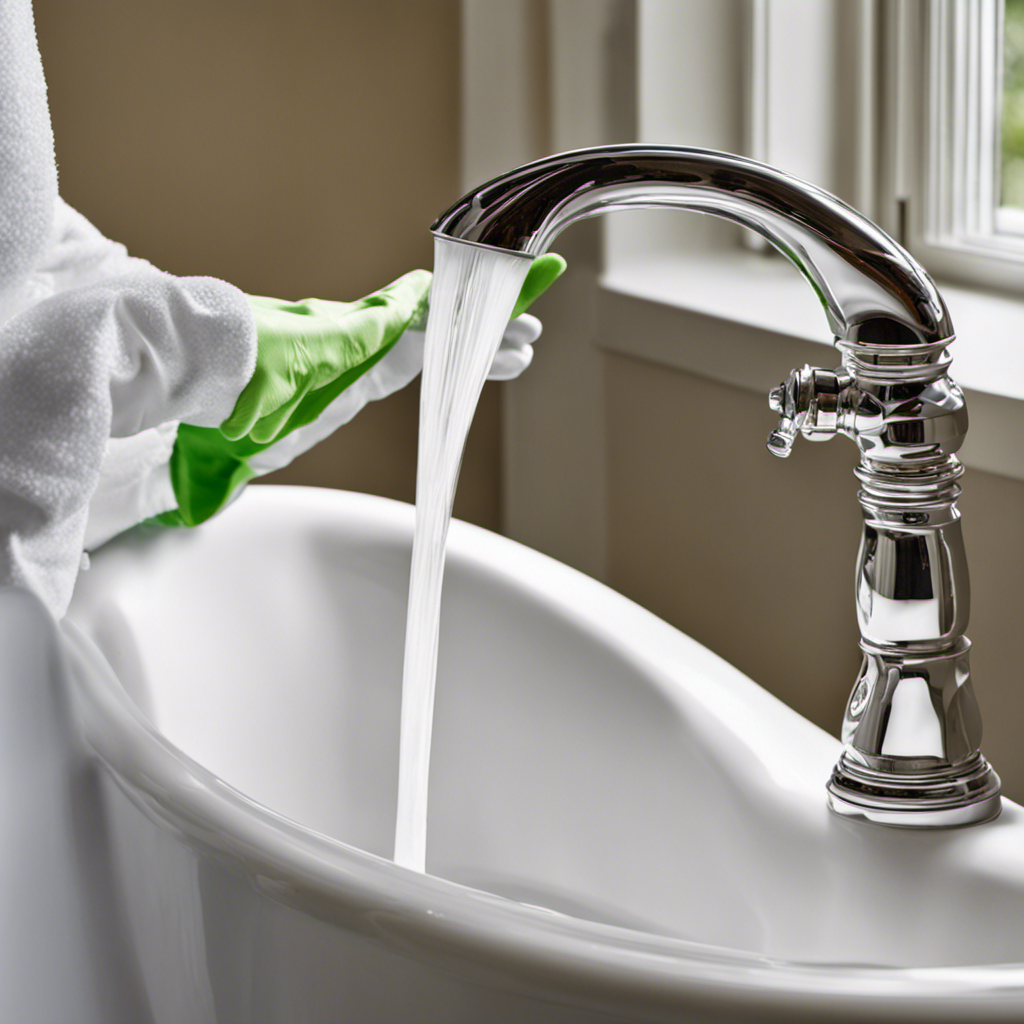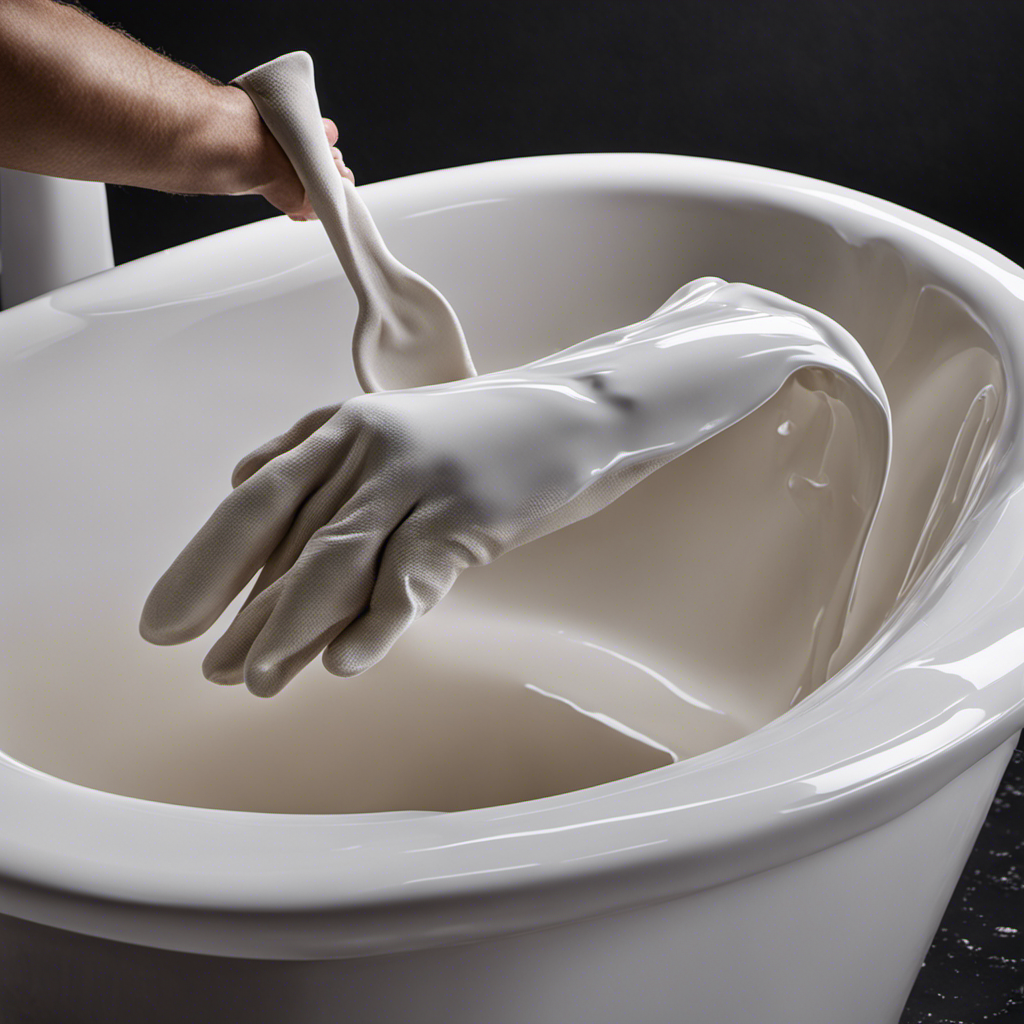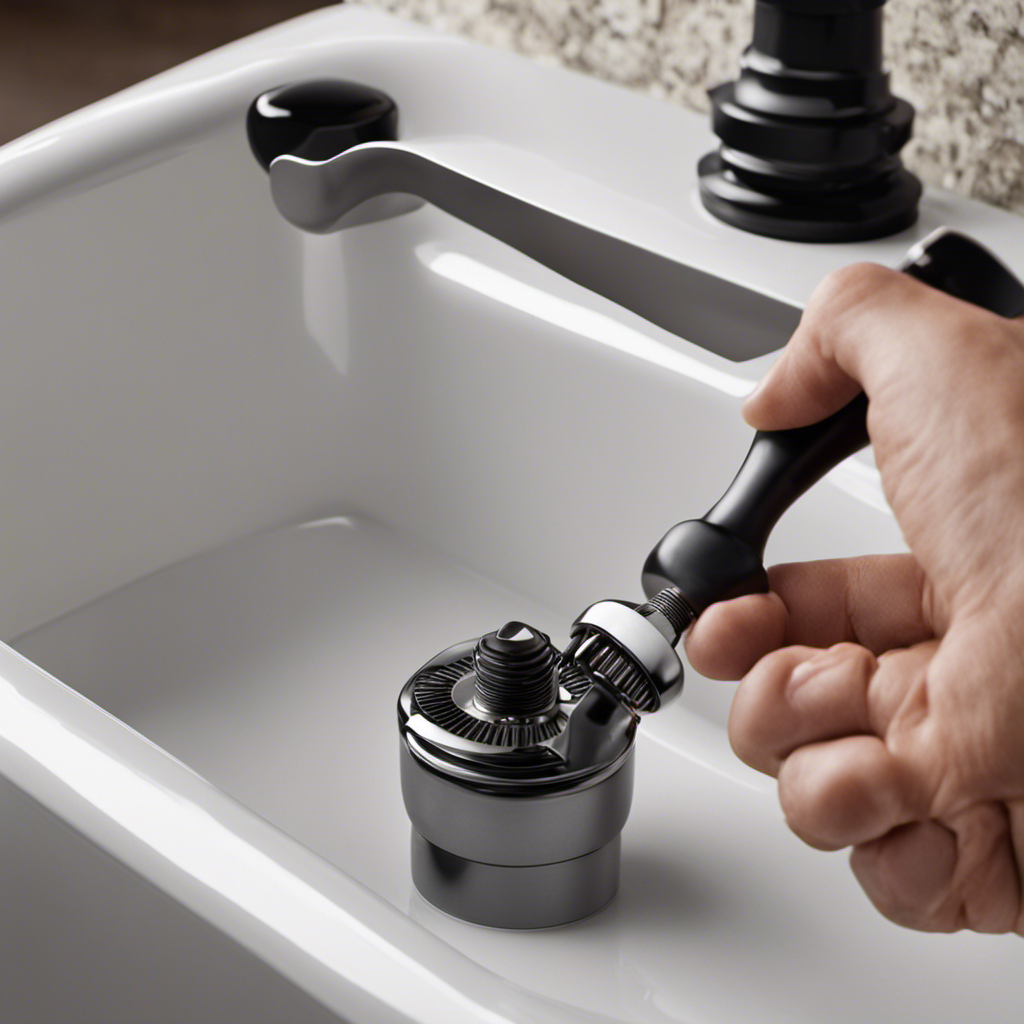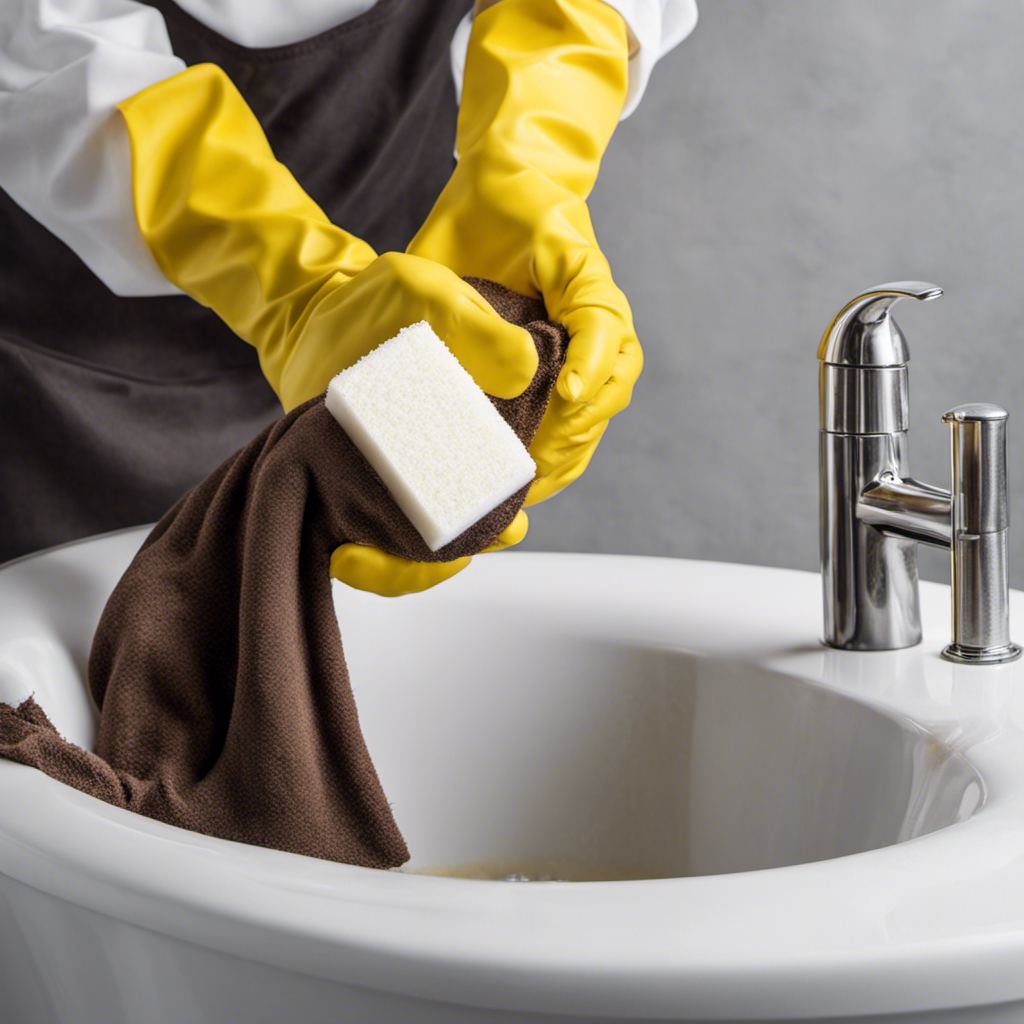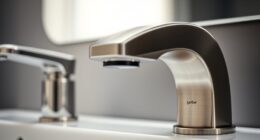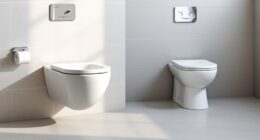Are you tired of battling those stubborn hard water deposits on your bathtub faucet? Say goodbye to the frustration and hello to a sparkling clean faucet!
In this step-by-step guide, we will show you how to easily remove those pesky deposits, using everyday supplies you already have at home. Get ready to restore your faucet to its former glory and enjoy a refreshing and satisfying shower experience once again.
Let’s dive in!
Key Takeaways
- Identifying and preventing hard water deposits is important for maintaining the bathtub faucet.
- Regularly cleaning and maintaining the faucet can help prevent the formation of hard water deposits.
- Using a water softener system can help prevent further deposits.
- White vinegar, lemon juice, and baking soda are effective cleaning solutions for removing hard water deposits.
Identify the Hard Water Deposits
You can easily identify the hard water deposits by looking for white or chalky buildup on your bathtub faucet.
To determine if your water is hard, you can use a water testing kit available at most hardware stores. This will help you understand the mineral content and hardness of your water.
Once you have confirmed that you have hard water, it is important to take preventive measures to avoid further deposits. One effective way to prevent hard water deposits is to install a water softener system in your home. This will remove minerals that cause the buildup and ensure that your water is soft and free from deposits.
Regularly cleaning and maintaining your faucet can also help in preventing the formation of hard water deposits.
Gather the Necessary Supplies
To get rid of those stubborn stains, make sure you’ve got all the necessary supplies.
When it comes to removing hard water deposits from your bathtub faucet, you’ll need a few key items. Firstly, you’ll need a pair of gloves to protect your hands from any harsh chemicals.
Next, grab a soft cloth or sponge, as well as a toothbrush with soft bristles for those hard-to-reach areas.
You’ll also need white vinegar, which is an effective natural cleaner for removing hard water deposits. If you prefer an alternative method, you can use lemon juice or baking soda instead. These household items work just as well.
With all your supplies ready, let’s prepare a cleaning solution to tackle those hard water deposits and restore your faucet to its former glory.
Prepare a Cleaning Solution
Once you’ve gathered all the necessary supplies, it’s time to mix up a cleaning solution. The cleaning solution you choose will depend on the severity of the hard water deposits on your bathtub faucet. Here are a few different types of cleaning solutions you can try:
| Cleaning Solution | Ingredients | Effectiveness |
|---|---|---|
| Vinegar Solution | White vinegar and water | Highly effective |
| Lemon Juice Solution | Lemon juice and water | Moderately effective |
| Baking Soda Paste | Baking soda and water | Mildly effective |
To prevent hard water deposits from forming in the future, here are a few tips:
- Wipe down the faucet regularly with a soft cloth.
- Use a water softener or install a water filtration system.
- Avoid using harsh chemical cleaners that can damage the faucet surface.
Now that you have your cleaning solution ready, it’s time to move on to the next step: applying the cleaning solution to the faucet.
Apply the Cleaning Solution to the Faucet
After mixing up the cleaning solution, it’s time to apply it to the faucet using a soft cloth. This step is crucial in removing hard water deposits and maintaining the cleanliness of your faucet.
There are different types of cleaning solutions that you can use on faucets, depending on the severity of the deposits and the material of your faucet. For mild deposits, a mixture of vinegar and water can be effective. For more stubborn deposits, you can use a commercial lime scale remover or a solution of baking soda and hydrogen peroxide.
Regular maintenance is important to prevent the buildup of hard water deposits and keep your faucet looking and functioning its best. By applying the cleaning solution regularly, you can ensure that your faucet remains free from deposits and in optimal condition.
Rinse and Polish the Faucet
Now it’s time to rinse off the cleaning solution and give your faucet a nice polish to make it shine. Follow these steps to deep clean your faucet and get rid of those stubborn hard water stains:
-
Turn on the Water: Start by turning on the water to a medium flow. This will help remove any remaining cleaning solution from the faucet.
-
Use a Clean Cloth: Take a clean, soft cloth and dampen it with water. Make sure to wring out any excess water before using it on the faucet.
-
Wipe the Faucet: Gently wipe the entire surface of the faucet, focusing on the areas with hard water stains. Apply a bit more pressure to remove any buildup.
-
Dry and Polish: After rinsing off the cleaning solution, use a dry cloth to thoroughly dry the faucet. Once dry, take another clean cloth and apply a small amount of faucet polish. Polish the faucet in circular motions until it shines.
Frequently Asked Questions
What Are the Potential Health Risks Associated With Hard Water Deposits on Bathtub Faucets?
Potential health risks associated with hard water deposits on bathtub faucets include exposure to bacteria, mold, and mineral buildup. Cleaning methods, such as using vinegar or lemon juice, can effectively remove these deposits and reduce the risk of health issues.
Can Hard Water Deposits on Bathtub Faucets Cause Damage to the Plumbing System?
Hard water deposits on bathtub faucets can potentially cause water damage and affect water pressure. To prevent these effects, it is important to remove the deposits regularly and maintain the plumbing system.
How Can I Prevent Hard Water Deposits From Forming on My Bathtub Faucet in the First Place?
To prevent hard water deposits on your bathtub faucet, regularly clean it with a mixture of vinegar and water. Scrub gently with a toothbrush, then rinse thoroughly. This will keep your faucet free from mineral buildup.
Are There Any Natural Remedies or DIY Solutions to Remove Hard Water Deposits From Bathtub Faucets?
To remove hard water deposits from your bathtub faucet, try natural remedies and homemade solutions. One option is to use a mixture of vinegar and water. Follow these steps to effectively remove the deposits.
How Frequently Should I Clean My Bathtub Faucet to Prevent Hard Water Deposits From Building Up?
To prevent hard water deposits from building up on your bathtub faucet, it is recommended to clean it regularly. This will help maintain its functionality and prevent the need for intense cleaning later on.
Conclusion
Congratulations! You’ve successfully conquered those stubborn hard water deposits on your bathtub faucet! By following these simple steps, you’ve transformed your faucet into a shining beauty once again.
Remember to keep up with regular cleaning to prevent future buildup. Now, sit back, relax, and revel in the euphoria of a job well done.
You’ve mastered the art of faucet restoration, and your bathroom will thank you for it. Happy cleaning!
